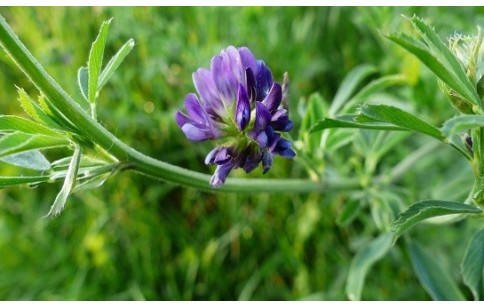- Code : #0557 S 10 mg
- Formula : C₁₅H₈O₅
- CAS : 479-13-0
Medicago sativa
Medicago sativa, “Alfalfa” in English and “Luzerne” in French, belongs to the Fabaceae botanical family. Probably native to the ancient Persia area (from Turkey to Afghanistan), it is a herb growing up to 0.8 m that has a wide range of adaptation from mountain areas to Mediterranean climates and very hot deserts.
It is cultivated mostly as animal feed and for soil improvement. Its sprouts and germinating seeds are edible.
Alfalfa aerial parts have a long tradition of therapeutical use in Ayurvedic and traditional Chinese medicine for the treatment of asthenia, cholesterol excess, kidney, bladder, prostate and menopause problems, skin problems; asthma, arthritis, osteoporosis, diabetes, stomach problems…
Research has validated its use for the treatment of atherosclerosis, heart disease, stroke, cancer, diabetes and menopausal symptoms.
Its main constituents are saponins (hederagenin), flavonoids (formononetin, myricetin), phytoestrogens, coumarins (scopoletin, esculetin), alkaloids, amino acids, phytosterols, vitamins, digestive enzymes and terpenes.

- Code : #0502 1 g
- Formula : C₉H₆O₄
- CAS : 305-01-1
- Code : #1248 S 10 mg
- Formula : C₁₆H₁₂O₄
- CAS : 485-72-3
- Code : #0035 S 20 mg
- Formula : C₃₀H₄₈O₄
- CAS : 465-99-6
- Code : #2321 S 10 mg
- Formula : C₃₀H₄₆O₆
- CAS : 599-07-5
- Code : #1127 S 20 mg
- Formula : C₁₅H₁₀O₈
- CAS : 529-44-2
- Code : #0558 S 20 mg
- Formula : C₁₀H₈O₄
- CAS : 92-61-5








